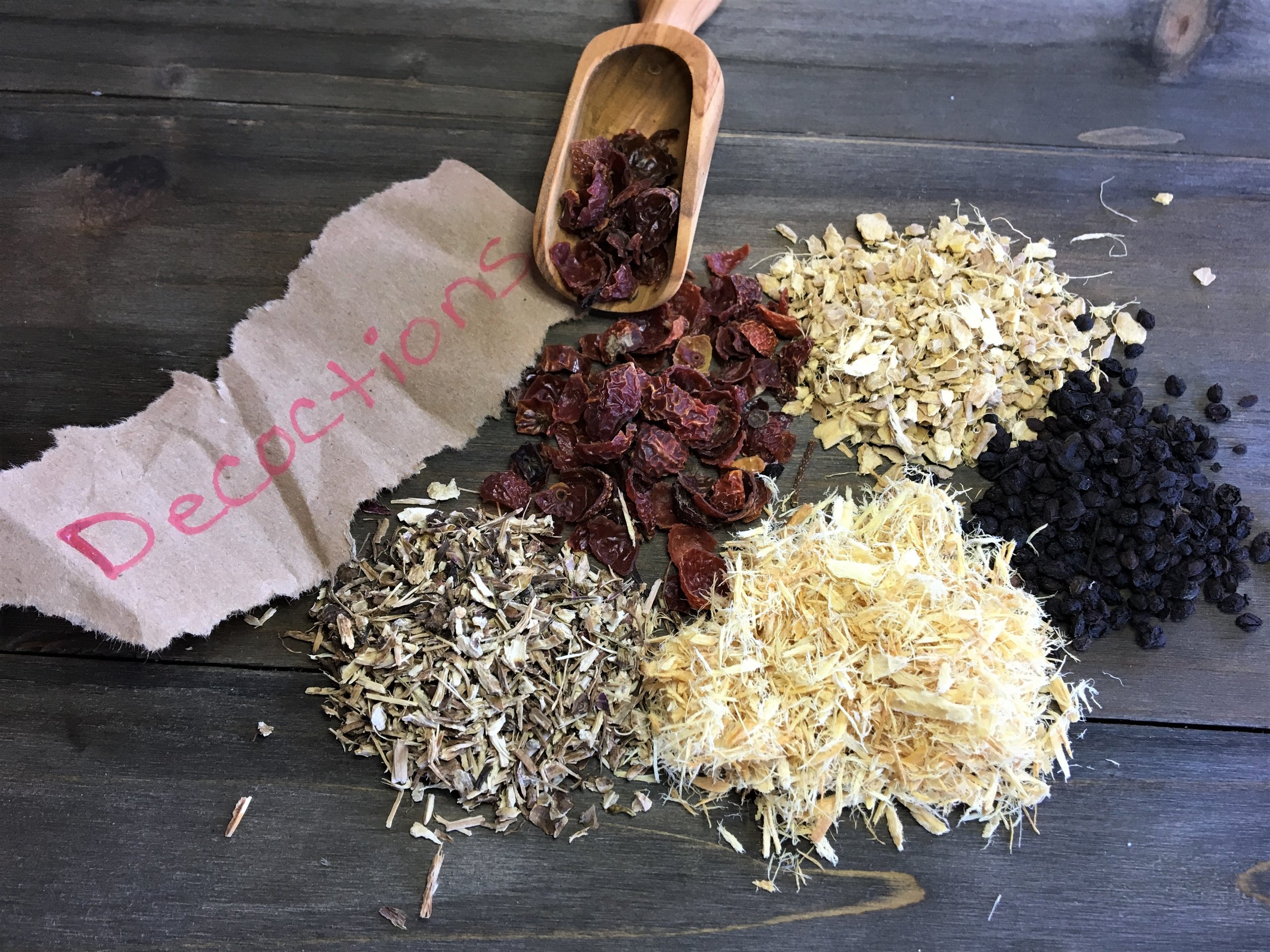Herbal Remedies for Beginners | How to Make a Decoction
Welcome back to our mini series on herbal remedies for beginner’s! Today we will be discussing decoctions, what they are and how to make them. If you missed the other posts in this series check them out below.
What is a Decoction?
A decoction is an herbal preparation made by boiling herbs in water to extract the beneficial water-soluble nutrients.
According to herbalist James Green
“the object of preparing decoctions is to secure, in aqueous solution, the soluble active principles of herbs that are hard and woody and have a close, dense texture” (Green, 2000, pg. 112).
Meaning, a decoction is similar to an infusion, except it’s used for harder herbs such as roots, bark, etc. Because they are harder and denser means it takes a little more effort to extract the nutrients.
How to make a decoction
There are, of course, ways to make a decoction complicated, but that’s certainly not necessary. If you haven’t realized by now, I really really like to keep things simple whenever possible. So here are the steps to easily make a decoction.
Rule of thumb for making a decoction is to use 1 teaspoon to 1 tablespoon per cup of water. Or for a larger batch use 1 heaping tablespoon to 1/4 cup of dried herb per quart of water. Because a decoction is a bit more time consuming than just preparing a cup of tea, I really only ever make this in larger batches.
Add your herb of choice to an appropriate sized saucepan
Pour cool to cold water over the herbs
Bring the water to a gentle boil
Place a lid on the pot and simmer for 20-40 minutes. (I generally turn the heat down at this point.)
Remove from heat and allow to cool a bit
Carefully strain off the herbs and drink as desired
Store any leftovers in the fridge for up to 48 hours
Tips and tricks
Re-use the herbs
Because we are using really hard plant materials, you will generally be able to use the herbs for another batch, possibly two. You’ll be able to tell by how strong the previous batch was. Either use the herbs right away to make an additional batch, or I know people who stick the used herbs in the freezer to keep them from molding. Then simply pull them out of the freezer, and make a decoction as usual.
Use cold water
There is some chemical reaction that occurs if you pour boiling water directly over the herbs making it difficult for many of the plant constituents to release into the water. By using cool to cold water you allow the herbs to warm up gently and thereby release all the water soluble nutrients into the water.
Using fresh herbs
It is absolutely okay to use fresh herbs if you have access to them, simply use more of them to compensate for the higher moisture content in fresh vs. dry herbs.
Infusing into a decoction
Remember how we discussed that infusions are made using softer herbs? Well once you start having some fun with herbs and want to make your own herbal tea blend, you may find yourself mixing soft and hard herbs. But they infuse into water at different rates so here’s the solution: First decoct your harder herbs into water following the previous instructions. Once you remove the decoction from the heat you will then add in your softer herbs like the flowers, leaves, etc. Allow them to steep together for a few minute,s leaving the pot covered. Strain off and drink!
Grinding herbs before using
The fresher the herb, the better. Which also means that the larger the dried herb the better, as larger pieces don’t break down as quickly as powdered herbs. So if you have access to “whole” herbs, such as a cinnamon stick, use that over a powdered herb. Then using a mortar and pestle grind it into smaller pieces right before decocting. Not only will that give you a fresher decoction, but the smaller pieces allow more surface area to be in direct contact with the water. Of course, if you only have access to powdered herbs, use them!!! Don’t stress. Just start somewhere.
Popular herbs to decoct
Need a little inspiration to get started? Here are a few popular herbs to decoct.
Dandelion root (roasted or not)
Chicory root (you can actually mix roasted dandelion and chicory root to make a type of herbal “coffee”. I’ve tried it—not too bad actually!)
Astragalus
Ashwagandha
Cinnamon
Mushrooms such as reishi, chaga, shiitake, etc.
Milk thistle
Ginger
WHERE TO PURCHASE
I appreciate you taking the time to read my blog! By purchasing through one of my affiliate links you will not spend a penny more, but you are allowing me to receive a small commission. This allows me to keep posting great content for you. Thanks for your support! Read more here.
If you are unable to grow your own herbs, or find ingredients locally, then here are two of my favorite places to buy bulk ingredients:
This company is where I purchase the majority of my seeds. Great selection of heirloom and/or organic seeds:
These are hands down my favorite seed starting trays and pots. These are heavy duty and don’t crumple when you pop your plants out! Definitely worth the investment in my opinion.
Now it’s your turn!! Which herbs are you going to try decocting? I would highly recommend making a delicious ginger decoction using fresh or dried ginger. So good for digestion and it tastes pretty darn amazing! Adding a teensy bit of raw honey and you have a perfect afternoon pick-me-up.
Enjoy!










